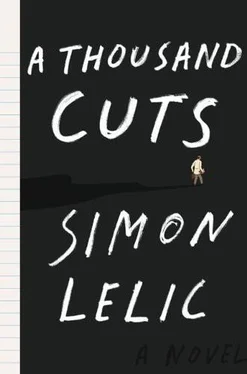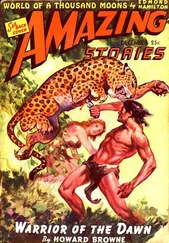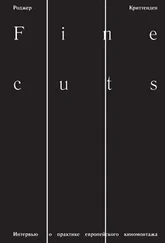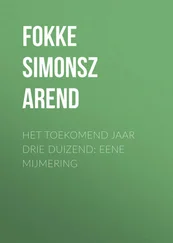Lucia propped her elbows in the space where her plate should have been. ‘Start by telling me what you told Philip. After that ... Well. After that, we’ll just have to see.’
He showed me the gun.
Well, he didn’t show me as such but I saw it. The week before the shooting, this was. We were in the staffroom and I was sitting next to him and I spotted it when he opened his briefcase.
I say the gun but I suppose it was just a gun. I’m only assuming it was the one he used. To be honest, it didn’t even look like it would fire but that sort of tallies with what people have been saying. That it was an antique. A museum piece. From the war or something. That’s what people are saying, isn’t it?
So it was the gun, I suppose. It was wedged between a file and a stack of papers, like it was a Thermos flask or his lunch box or something. Like it was anything but what it was.
I say, Samuel, sort of laughing. That’s not what I think it is, is it? He says, pardon me, and I nod. That, I say. In the case. It’s not what I think it is.
Oh, says Samuel. Oh. You mean this?
And he lifts the lid of his case wide and picks up the gun by the handle. His finger finds the trigger and for a moment the barrel is pointing right at my head.
I sort of laugh again. I mean, I wouldn’t make much of a policeman, would I? Someone points a gun at my head and all I can do is give a nervous giggle. But anyway, that’s what I did. And I say, Samuel, I’d rather you… I mean if you could not please… So I giggle and I can’t even finish a sentence.
Samuel says oh again. He says, no, no, no, don’t worry. And he turns the barrel so it’s pointing at the back of his case, at the upturned lid of his case, and beyond the lid, sitting opposite, is Terence, Terence Jones, TJ to those who know him, and Samuel’s got the gun pointed right at him. And TJ can’t see this because he’s reading the newspaper and anyway the gun’s still hidden by the briefcase. And Samuel, his finger’s there on the trigger and I can tell he’s about to squeeze. As in, fire. The gun. At TJ.
So what do I do?
I do nothing. I watch. It’s all I can do. Like I say, you’d be happy to have me on the force.
But as it turns out the gun doesn’t fire. Samuel pulls on the trigger but it sticks. It doesn’t move. And Samuel looks up at me and he’s not exactly smiling but he looks pretty pleased with himself nonetheless. Do you like cats, Inspector? I like cats. I have three. And Samuel looks like my tabby, Ingrid, when she’s eaten her share of the giblets and Humphrey’s and Bogart’s too.
Samuel, I say. Really. And still I’m struggling to think what to say to him. Because it’s not the type of situation you ever contemplate dealing with, is it? Not if you’re someone like me. I’m interested, Inspector: how would you have reacted, do you think? If you had been me? Because you would have done what was right, I’m sure, and not just because of your training. Although I suppose it’s perfectly obvious to me now. I should have wrestled the gun from him. I should have pinned him to the floor. I should have called for the headmaster, told the headmaster to call the police. That’s what I should have done. That’s what I wish I had done. Naturally that’s what I wish.
But at the time I was waiting for an explanation. That’s what rational human beings do, isn’t it, when they’re confronted with something beyond the scope of their everyday experience? They withhold judgement. They offer the benefit of the doubt. They fear the worst perhaps but they know deep down that there will be a perfectly reasonable explanation. That’s the very phrase people use, in fact, isn’t it? You’ll see, they say. I’m sure there’s a perfectly reasonable explanation.
And Samuel gave me one.
He drops the gun into the briefcase, rather carelessly. He clicks the briefcase shut. He says, it’s real but it doesn’t work. It hasn’t worked since 1945. It was my grandfather’s, he says. Or rather, it became my grandfather’s. He stole it. Won it. However you want to look at it. He got it from a German, a Nazi. In Italy. My grandfather fought in Italy.
Which is fascinating, rather, isn’t it? I teach religious studies but my subject and Samuel’s are so intertwined that really the syllabuses should be merged. That’s what I think anyway. Because what’s the study of religion but social history? What’s faith but an empathy with the past? But that’s not why we teach religious studies, I’m told. My views, depending on who you talk to, are old-fashioned or avant-garde. Which is fine, I suppose. I’m not complaining. And I’m in danger of straying from the point. Which is, Inspector, that what Samuel said intrigued me. His explanation was logical and fascinating both. The gun was a relic from the war and he was, he told me, teaching his sixth-formers about Monte Cassino. He wanted to engage them, he said. Show them something that would bring them forwards on to their elbows rather than send them back on to their heels. Which is just the sort of thing Samuel would say because there was nothing he wanted more than to get his kids interested. I mean, all teachers, regardless of their subject, can empathise with the sentiment but for Samuel it had turned into a mission. He was committed. He was determined. He must have been, mustn’t he? To put up with what he did. To keep coming into work after everything that happened.
So I’m convinced but still I manage to keep some sense about me.
Do you think that’s wise? I ask him. It’s a gun after all. And this is a school.
He shrugs.
I say, I mean it, Samuel. I really think you should be careful. The parents, the headmaster, the pupils for heaven’s sake… Just imagine how they might react.
Now Samuel does smile and I don’t like that smile at all. But it’s a flicker, a spark that catches and then goes out, and after it fades it’s hard to tell if it was even a spark at all. Maybe you’re right, Samuel says. Maybe you’re right.
I’m glad you think so, I say, because I really think… But then the bell goes and everyone gets up because it’s the last double period before lunch. And neither one of us says anything more.
This would have been the Wednesday so it was exactly a week before. After that, I watched him fairly closely. As closely as I could, at any rate. It was hard, though, because we taught in different wings and neither one of us spent a great deal of time in the staffroom. We each had our reasons. He was a fairly solitary figure and I suppose I’ve always been one too. But I like to think that I am happy in my own company. There are moments, naturally, when I crave companionship and usually they coincide with times when there is none on offer. What’s that – Murphy’s law? Anyway, at school when I go to the staffroom it’s usually to hear adult voices. Even TJ, for all his shortcomings, can seem a calming presence after you have been floundering all day amid the shrillness of youth. But Samuel: he was never happy in his own company. If this doesn’t sound too self-important, Inspector, I’ve always seen myself as something of a spiritual barometer in this school. It’s not a role anyone else would recognise, naturally, more an extension of my particular specialisation. Not even that, really. I’m just interested in people. That’s all. I’m nosy, you might say. I like to know how people cope. Within themselves. What drives them. What undermines them. There’s no great skill involved. You just have to listen more than you talk. You seem to listen well, Inspector, so I’m sure you know exactly what I mean. And with Samuel, it was obvious from the very start. Not that he would do what he did. Heavens. How could a balanced individual expect that of anyone? It was obvious, rather, that he was troubled. Sad. Sad is the word. Sad and lonely and unable to break from the mould into which his life had settled.
Читать дальше












